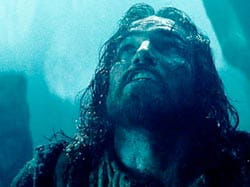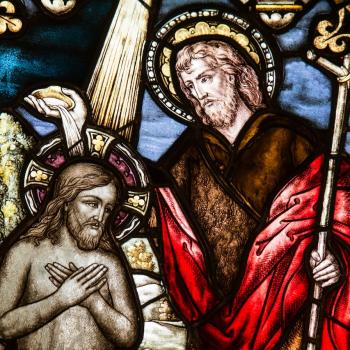 Sweet the wood; sweet the nails, sweet the weight they bear.
Sweet the wood; sweet the nails, sweet the weight they bear.
Even as a sophomore in high school, on the girls' basketball team, I had a Greek sense of the nobility of the athlete. I once wrote that I was willing to die for those girls, my teammates, and I wasn't entirely kidding. "I have fought the good fight, I have finished the race, I have kept the faith," observed St. Paul (2 Tim. 4:7), and to follow Christ, you do have to be an athlete of sorts. You have to train in loneliness, in poverty, in being persecuted, in pain, and in being misunderstood, in resisting a culture that encourages you to anaesthetize yourself, to take the shortcut, to not feel or think.
Years ago I read a column by Ron Rolheiser: "The Agony In The Garden—The Place To Ready Ourselves For Ordeals."
Rolheiser wrote:
Luke's account of Gethsemane says this of Jesus: "And being in a certain agony (AGONIA), he prayed more earnestly." This word, AGONIA, doesn't just describe the intensity of Jesus' suffering, but also his readying of himself for the painful task that awaits. How?
An athlete doesn't enter the arena of competition without first properly warming up and, at the time this text was written, a serious athlete would warm up for a competition by first working himself or herself into a certain intense sweat, a lather, an AGONIA, so that he or she wouldn't enter the competition with cold muscles . . .
In the Garden of Gethsemane, Jesus dies before he dies and in that way readies himself for what awaits him . . .
Sports is a rudimentary form of self-sacrifice. You bond with your teammates and, together, consecrate yourselves to something higher. You "die" to yourself in favor of the shared goal of winning the game. This form of self-sacrifice, calling forth a deep nobility, underlies the family, politics, and war. You lay down your life for your teammates, your family members, your country.
But there is one thing higher, and that is to lay down your life for all mankind. To lay down your life not just for your own family, but for everyone's family. To lay down your life not only for your friends, but for your enemies. To love each other as we are loved by Christ. Christ, the sinless victim who could have vaporized the entire Roman army with a word, but who chose not to. Christ, who could have knocked over the chalice with a glance, but who chose instead to drink it to the last drop. Christ, who could have chosen to be impervious, untouchable, unwoundable, but instead became one of us.
To let go of the fruits of our work, our lives, is in some sense to die. Behind all true spiritual pilgrimage is the willingness to relinquish control. You're moved to leave something behind and go—without knowing why, or how the journey will end. You have to be willing to not be "productive" or efficient or relevant. You have to be willing to have "nothing" happen. You have to know that your pilgrimage, your contest, is a matter of life and death.
A runner friend of mine once described a race during the course of which she made a conscious decision to put the focus not on winning but on letting go. "My surrender of autonomy came in the form of declining to measure effort in a rational or strategic way. It was really a sacrifice of focus or drive. In racing, this is a tremendous risk, usually a grave mistake."
Again, Christ's passion comes to mind. The intention, focus, and drive remain absolute; but the object is not so much to win, as it is in a race or a war, but to offer oneself up, to relinquish control over the results (while still, of course, wanting to "win"; i.e., there's nothing in it of resignation, or giving up, or out of false modesty, allowing the adversary to win). Faith consists in just this "letting go" into a way of being we can't yet imagine—startling, new. Interesting that the "aching, ugly, beautiful moment" this same runner described experiencing later in the race could also have been applied to childbirth.
The Crucifixion was Christ's "race." He trained all his life. He took the gravest of risks. Like my runner friend, he declined to measure effort in a rational or strategic way. He worked up his bloody sweat, his agonia, in the Garden of Gethsemane the night before. He endured betrayal, scorn, ridicule, and all the evil in men's hearts. He bore the scourge, the crown of thorns, the sponge soaked in gall, the nails. With his last drop of strength, he consoled the thief beside him. With his dying breath, he commended his spirit to God. He refused to return violence for violence and thereby established the eternal triumph of faith over fear, love over hatred, good over evil, life over death. He finished the course.
And there at the foot of the cross stood Mary. Torn with grief, but still standing. In anguish, in horror, but still standing. With the sorrow of the world on her shoulders but still standing.
For to his finest, most sublime hour—as any great athlete would—Christ had invited his mother.
4/19/2011 4:00:00 AM





